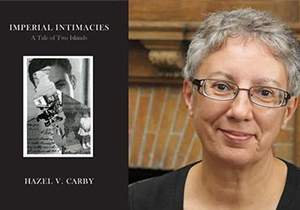
in hardcover or as an ebook from
Verso Books.
The blog was written by NYG&B Summer Intern Paul Brancaccio. Paul is a graduate student at Florida International University in Miami, where he is completing an accelerated BA/MA in History. In this blog, he examines how genealogy can provide an engaging and accessible lens into history using Hazel V. Carby's book Imperial Intimacies: A Tale of Two Islands as an example.
Hazel Carby appropriately describes her newest book, Imperial Intimacies: A Tale of Two Islands (2019), as a “spider’s web spun across the Atlantic.”
The text is rich in connections, as Carby describes how different generations of her family have influenced one another and explores fascinating parallels between her Welsh matrilineal line and Jamaican patrilineal line. The book follows Carby through her early years, dives into her genealogy, and examines how historical currents have affected her family. All of these functions collaborate to make Imperial Intimacies a stimulating and valuable read.
This blog post will not provide a summary or traditional book review of Imperial Intimacies (if you are interested in such a piece, Maya Binyam offers a great review in The New Yorker). It will instead present three lessons that genealogists can take away from Imperial Intimacies and use in their own research and writing.
1. You have a role in your family history.

Charles C. and Dorothea S. Dilley
Professor Emeritus of African
American Studies at Yale University
Imperial Intimacies reminds readers that genealogies are not simply quaint stories about ancestors; our family histories have played a powerful role in shaping our lives.
A profound moment in the text is when Carby examines how her great-grandparents' decision to move to Cardiff, the capital of Wales, would cause a series of trials for her grandmother, mother, and self. Carby’s great-grandparents did not realize the health risk that this move would entail: the overwhelming air pollution from Cardiff’s industrial sector would cause fatal damage to their daughter (Carby’s grandmother) Beatrice in the long term. Thus, when Carby’s mother Iris was finishing secondary school, Beatrice would develop a severe case of tuberculosis that would ultimately lead to her death.
These details become particularly tragic given the backstory Carby had already given readers about Iris. Despite being a strong student with a potentially promising future, Iris made the difficult sacrifice to not finish secondary school or pursue higher education so she could care for Beatrice. As a result, Iris would experience trying economic and social conditions during adulthood. Her pay was low, and she faced exploitation and sexual harassment in the workplace.
These struggles trickled into Carby’s life. Her mother was highly irritable from tiring work days and they struggled financially as a family. In fact, as a teenager Carby had to bail her mother out of jail. Iris had been arrested after accumulating crushing debt to buy labor-saving appliances, a necessary investment to balance full-time work with domestic labor. Imperial Intimacies shows that this moment in Carby’s life, and these pivotal developments in both her mother and grandmother’s lives, linked back to her great-grandparents’ unwittingly harmful move to Cardiff.
Family historians would do well to follow Carby's example by considering how their ancestors’ decisions and circumstances have influenced their own lives.
2. Genealogical speculation is helpful where primary sources are lacking.
The ancestors Carby discusses were mostly working-class people and slaves, and they did not leave behind a lot of primary sources. However, Carby uses evidence-based speculation about these individuals to still tell a compelling story filled with realistic hypotheses.
For example, she uses an early-nineteenth-century “leading handbook on growing coffee” to envision what her slave ancestors' day-to-day work on a coffee plantation was like. She hypothesizes that plantation owners monitored them from a house on top of a hill. And when trying to figure out how the slaves under Lilly felt towards him, she consults the writings of a Barbadian slave that accused English slave owners of forgetting “God and all feelings of shame.”
Other family historians researching people who did not leave behind many primary sources may find Carby’s methods helpful. They can look at documents that describe the spaces their subjects occupied and the experiences of those who led similar lives. They can also review documents that aimed to guide their subjects’ behavior and use this material to tell valuable speculation-based stories.
Genealogists have the opportunity to take abstract historical concepts and make them understandable and concrete.
3. Your genealogy can make history more digestible and engaging.
Genealogy’s value as a gateway into history is hopefully evident throughout this post, but it’s important to emphasize. Genealogists have the opportunity to take abstract historical concepts and make them understandable and concrete.
For instance, while the social effects of industrialization may be difficult to fully grasp, Carby’s description of how it influenced her matrilineal line for multiple generations provides a unique and insightful perspective on the matter. And since these stories are told from the perspective of someone directly influenced by this history, readers are more likely to take interest in the content.
Our internship program is made possible due to the generous contributions of our donors. Learn more about our internship program, and please consider making a donation, which will support current and future interns.
